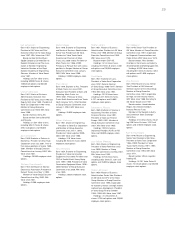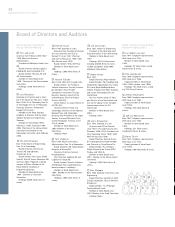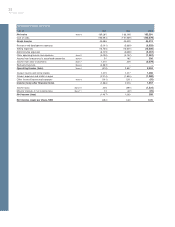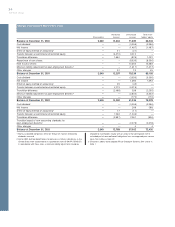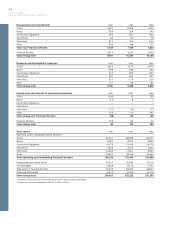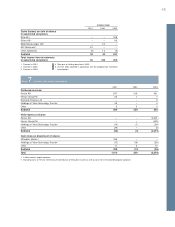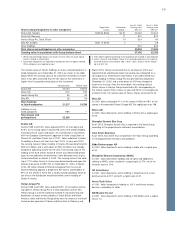Volvo 2003 Annual Report Download - page 41
Download and view the complete annual report
Please find page 41 of the 2003 Volvo annual report below. You can navigate through the pages in the report by either clicking on the pages listed below, or by using the keyword search tool below to find specific information within the annual report.
39
AB Volvo’s holding of shares in subsidiaries as of December 31,
2003 is shown on pages 81–83. Significant acquisitions, formations
and divestments within the Group are listed below.
L.B. Smith (SABA Holding Inc.)
On May 2, Volvo Construction Equipment purchased the assets
amounting to USD 189 M associated with the Volvo distribution
business of L.B. Smith Inc. in the US. No goodwill or real estate was
included in the deal. Because the intention is to spin off the acquired
operations, the L.B. Smith distribution business has not been consoli-
dated in the Volvo Group’s financial statements during 2003.
Bilia’s truck and construction equipment business
(“Kommersiella Fordon Europa AB”)
In the third quarter 2003, the acquisition of the truck and construc-
tion equipments operations of Bilia was completed. Volvo exchanged
41% of the shares in Bilia AB for 98% of the shares in Kommer-
siella Fordon Europa AB. Volvo has required compulsory acquisition
of the remaining shares. The acquired operations include dealers and
service suppliers for trucks and construction equipment in the Nordic
region and ten other european countries. The acquisition cost of the
shares has been determined to SEK 0.9 billion. The goodwill arising
from this transaction amounted to SEK 0.6 billion.
Volvo Baumaschinen Deutschland GmbH
In February 2003 Volvo Construction Equipment sold the German
dealer Volvo Baumashinen Deutschland GmbH to the Swedish dealer
partner Swecon Anläggningsmaskiner AB.
Volvo Aero Services LP
During 2002 VNA Holding Inc acquired an additional 9% of the
shares in Volvo Aero Services LP (previously The AGES Group ALP).
Thereafter, Volvo owns 95% of Volvo Aero Services LP.
Prévost Holding BV
On October 1, 2001 Volvo Buses divested 1% of Prévost Holding
Note 2Acquisitions and divestments of shares in subsidiaries
BV, a Canadian and North American bus manufacturer, to Henlys
Group Plc. Thereafter Volvo and Henlys Group Plc own 50% of
Prévost Holding BV each. Thus, effective on October 1, 2001,
Prévost Holding BV is a joint venture and reported in the Volvo
Group accounts in accordance with the proportionate consolidation
method.
Acrivia AB (former OmniNova Technology AB)
In April 2001, Volvo Buses acquired 65% of Acrivia AB, an engineer-
ing company that develops production processes for buses and
produces frames for the new TX platform, from TWR Sweden AB.
Thereafter, Volvo Buses owns 100% of Acrivia AB.
Low Cab-Over-Engine (LCOE)
On July 27, 2001 Volvo Trucks North America agreed to sell its
LCOE business to Grand Vehicle Works Holdings, LLC. By divesting
its LCOE operations, Volvo met the condition imposed by U.S. Depart-
ment of Justice for approval of its acquisition of Mack and Renault V.I.
Volvia
On February 8, 2001, Volvo’s wholly owned subsidiary, Volvia
reached an agreement covering the divestment of its insurance
operations. The buyer is the If insurance company. The purchase
price for the operations was 562.
Renault V.I. and Mack
On January 2, 2001, AB Volvo’s acquisition of Renault’s truck opera-
tions, Mack and Renault V.I., became effective. Under the terms of
acquisition AB Volvo acquired all the shares of Mack and Renault V.I.
in exchange for 15% of the shares in AB Volvo. The purchase price
for the shares was set at SEK 10.7 billion, based on the Volvo share
price on the acquisition date. Goodwill amounting to SEK 8.4 billion
that arose in connection with the acquisition is being amortized over
20 years. In connection with the acquisition, Renault V.I. Finance was
acquired for about FRF 154 M.
Provisions for residual value risks
Residual value risks are attributable to operational lease contracts
and sales transactions combined with buy-back agreements or resid-
ual value guarantees. Residual value risks are the risks that Volvo in
the future would have to dispose used products at a loss if the price
development of these products is worse than what was expected
when the contracts were entered. Provisions for residual value risks
are made on a continuing basis based upon estimations of the used
products’ future net realizable values. The estimations of future net
realizable values are made with consideration of current prices, ex-
pected future price development, expected inventory turnover period
and expected variable and fixed selling expenses. If the residual value
risks are pertaining to products that are reported as tangible assets
in Volvo’s balance sheet, these risks are reflected by depreciation or
write-down of the carrying value of these assets. If the residual value
risks are pertaining to products which are not reported as assets in
Volvo’s balance sheet, these risks are reflected under the line item
provisions.
Deferred taxes, allocations and untaxed reserves
Tax legislation in Sweden and other countries sometimes contains
rules other than those identified with generally accepted accounting
principles, and which pertain to the timing of taxation and measure-
ment of certain commercial transactions. Deferred taxes are provided
for on differences which arise between the taxable value and report-
ed value of assets and liabilities (temporary differences) as well as on
tax-loss carryforwards. However, with regards to the valuation of
deferred tax assets, these items are recognized provided that it is
probable that the amounts can be utilized against future taxable
income.
Tax laws in Sweden and certain other countries allow companies
to defer payment of taxes through allocations to untaxed reserves.
These items are treated as temporary differences in the consolidated
balance sheet, that is, a split is made between deferred tax liability
and equity capital (restricted reserves). In the consolidated income
statement an allocation to, or withdrawal from, untaxed reserves is
divided between deferred taxes and net income for the year.


